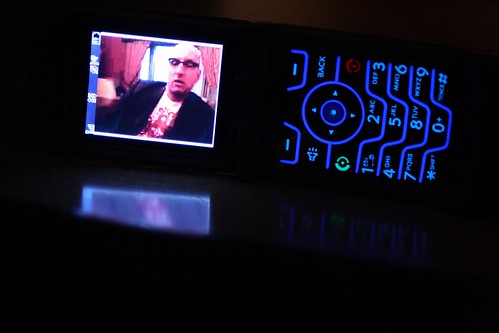

By Ray Pride Pride@moviecitynews.com
Soderbergh on shape-shifting widescreen cinema
 Steven Soderbergh’s got a compact screed at the DGA Quarterly website about 2.40 widescreen and its technical conversion for HD broadcast. “While there’s always an abundance of ugly things going on in the Actual World, there’s also something ugly going on in the Hi-Def World, and it isn’t just post-traumatic stress from the (pointless) Bluray/HD-DVD smackdown. It is another in a series of situations in which the default mode is an unnecessary compromise, and it won’t get fixed unless everyone gets on the same page. And it is precisely because this is not an Actual World problem that I believe there is hope—and a solution… Like many format fiends, I saw the advent of hi-def broadcast TV as the Holy Grail. Finally, the larger screens, greater detail, and more film-friendly 16:9 ratio would mean all films could live on forever with their extremities intact… Since the 16:9 image is now the shape of television, only one format remains to distinguish television from the movies: the 2.40:1 aspect ratio… Television operators, the people who buy and produce things for people to watch on TV, are taking the position that films photographed in the 2.40:1 ratio should be blown up or chopped up to fit a 16:9 (1.78:1) ratio. They are taking the position that the viewers of television do not like watching 2.40 films letterboxed to fit their 16:9 screens, and that a film insisting on this is worth significantly less—or even nothing—to them. They are taking the position that no one will dare challenge them and risk losing revenue… The end result is we have a better chance of seeing a 2.40 film from 1959 in its proper format than a movie from 2009. That’s weird, and sad. Now, I don’t want to spend a lot of time on this, because I have never believed that even a small portion of what happens in the entertainment industry matters that much, but it’s fucking lame to watch Jaws—a film that uses the 2.40 ratio as well as any ever produced—in the wrong format on HBO. Does Universal so badly need a few extra pennies that it’s willing to ruin a classic? And does HBO really think its viewers are so stupid as to forget movies currently come in two sizes?” The DGA Quarterly has the rest.
Steven Soderbergh’s got a compact screed at the DGA Quarterly website about 2.40 widescreen and its technical conversion for HD broadcast. “While there’s always an abundance of ugly things going on in the Actual World, there’s also something ugly going on in the Hi-Def World, and it isn’t just post-traumatic stress from the (pointless) Bluray/HD-DVD smackdown. It is another in a series of situations in which the default mode is an unnecessary compromise, and it won’t get fixed unless everyone gets on the same page. And it is precisely because this is not an Actual World problem that I believe there is hope—and a solution… Like many format fiends, I saw the advent of hi-def broadcast TV as the Holy Grail. Finally, the larger screens, greater detail, and more film-friendly 16:9 ratio would mean all films could live on forever with their extremities intact… Since the 16:9 image is now the shape of television, only one format remains to distinguish television from the movies: the 2.40:1 aspect ratio… Television operators, the people who buy and produce things for people to watch on TV, are taking the position that films photographed in the 2.40:1 ratio should be blown up or chopped up to fit a 16:9 (1.78:1) ratio. They are taking the position that the viewers of television do not like watching 2.40 films letterboxed to fit their 16:9 screens, and that a film insisting on this is worth significantly less—or even nothing—to them. They are taking the position that no one will dare challenge them and risk losing revenue… The end result is we have a better chance of seeing a 2.40 film from 1959 in its proper format than a movie from 2009. That’s weird, and sad. Now, I don’t want to spend a lot of time on this, because I have never believed that even a small portion of what happens in the entertainment industry matters that much, but it’s fucking lame to watch Jaws—a film that uses the 2.40 ratio as well as any ever produced—in the wrong format on HBO. Does Universal so badly need a few extra pennies that it’s willing to ruin a classic? And does HBO really think its viewers are so stupid as to forget movies currently come in two sizes?” The DGA Quarterly has the rest.















Thank you, Steven, for bringing this issue up. It has been driving me crazy ever since I started subscribing to HD channels. HBO is the WORST offender when it comes to altering 2.40 movies for 1.78 broadcast. The truth is: 2.40 composed films are being panned and scanned to fit the 16X9 format. It’s not just a matter of open matting them – compositions are shifted. The picture often has to be zoomed in to reduce excessive headspace or to finesse an awkward composition. I’ve seen this done in post many, many times. These films were composed for 2.40 (2.35) and they need to be presented in original aspect ratio on HD. Hats off to the Showtime Channel, which almost always presents in the 2.40 aspect ratio and I don’t see them losing any subscribers over that. HBO needs to get a fucking clue. Stop butchering our widescreen films to fit them to screen. It’s unnecessary – since they have access to 2.40 masters and (most) viewers watching HD understand the letterboxing presentation as a theatrical standard – which actually helps theatrical films stand apart from made for cable product. We need to hear from more filmmakers about this crap. Right now, HBO, Cinemax and Starz are the biggest culprits. Showtime gets it right.